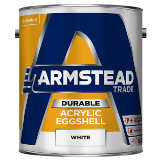Good to see you
Welcome to Armstead
Terms and Conditions
Thanks! for registering
Successfully registered, please login
Registration complete
Forgotten your password?
Please enter email address associated to your account
Change Password
Password changed successfully.
Request sent!
Would you spare a minute to answer 3 questions
Registration complete
Successfully registered, please login
Delete Account

Armstead Trade Durable Acrylic Eggshell
-
Good opacity
-
Ideal for high traffic areas
-
Water based
-
Tough, washable, mid sheen finish
-
Finish Eggshell
-
Coverage Up to 15m2/litre
-
Drying Time 3-4 hours
-
Recoatable 4-6 hours
-
Thinning Water 10
-
Composition Water-based
-
Durable
-
Quick Dryring
Product Description
Application Description
Technical & Safety Documentation
Colour Range
Tips & Advice
-
1. Preparing the SurfacesTo get the best results with Armstead Trade Durable Acrylic Eggshell, make sure surfaces to be painted are sound, clean and dry (new surfaces particularly must be fully dry). See Armstead Trade Datasheet AM204 for full information before use, available free on request by telephoning 0333 222 7070 or visiting armsteadtrade.co.uk. Before surface preparation, read the adjacent information about old lead paints.
-
2. After useCleaning After Final Use: Clean brushes and rollers immediately after final use to reuse them for future projects, saving you money and reducing waste. Cleaning Steps: 1. Remove Excess Paint: Scrape off leftover paint into a container for reuse. 2. Wash with Warm, Soapy Water: Clean brushes and rollers with warm soapy water in a sealed container like a bucket or tub. 3. Rinse Thoroughly: Rinse out all soap and paint residues into the same container. 4. Dry Naturally: Let tools air-dry and store in a dry, dust-free area. Dispose Responsibly: Settle Solids: Let paint solids settle at the bottom of the container. Pour off clear water for reuse or disposal. Disposal: Let remaining paint solids dry fully before disposing of them as solid waste. Do not flush paint down the drain, including when cleaning painting tools Pro Tip: Watch this cleaning guide from the British Coatings Federation and Dulux Connect contractor Bagnall’s: https://coatings.org.uk/general/custom.asp?page=HowToCleanPaintbrushes
-
3. StoringStoring & Responsible Disposal Do not use or store paint in extreme temperatures and protect from damp & frost. Reuse, Recycle, or Donate- Whenever possible, reuse, recycle, or donate leftover paint. Find local services at recyclenow.com. If no Community RePaint service is nearby, consider advertising paint locally—many good causes need it to brighten community spaces. Dispose Responsibly- Never pour paint or wastewater down drains or sinks. Follow instructions at recyclenow.com to recycle empty packs. Reuse Roller Cages- Remove sleeves and store cages in a dry, dust-free place. Dispose of Unusable brushes and Sleeves- If brushes or sleeves cannot be cleaned or reused, dispose of them in general waste to avoid recycling issues. Paint Wash Water- Collect wash water in a container; don’t pour it into drains or on the ground. Let solids settle, pour off clear water for reuse or disposal, and let solids dry before disposing as solid waste. Do not flush paint down drains, including when cleaning tools.
How much paint do I need?
Measure the height and length of the surface you want to paint (in metres or centimetres).


Your Measurements:
{{!-- This value will be injected with JavaScript --}}
Amount needed:
{{!-- This value will be injected with JavaScript --}}
Actual coverage will depend on the conditions of the surface. If the colour change is strong, more coats may be required.
Add a new space!
Add a new space!
Edit job
Delete Space
Are you sure you want to delete this space?
Save colour
Save to my workspace
Save product

Armstead Trade Durable Acrylic Eggshell
Save to my workspace